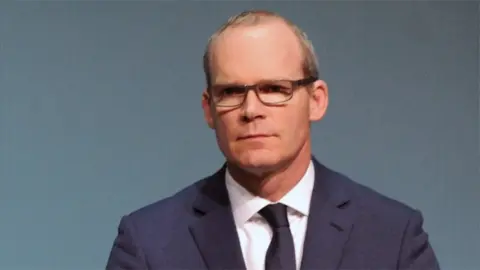NI Brexit: Simon Coveney says there is time to resolve issues
 RTE
RTEThere is still "time and space" for the UK and EU to deal with areas of disagreement on the NI part of the Brexit deal, Simon Coveney has said.
The Irish foreign minister was speaking to a joint Oireachtas (Irish parliament) committee on EU affairs.
A specialised UK-EU committee focused on how to work out details of the NI Protocol will meet again on Friday, he said.
The Brexit deal, agreed almost a year ago, treats NI differently from GB.
Known as the Protocol, it is due to come into effect at the end of this year and its aim is to avoid a hard border between NI and the Republic of Ireland.
Instead, it will see Northern Ireland continue to follow EU rules on agricultural and manufactured goods, while the rest of the UK will not.
Additionally, the whole of the UK will leave the EU's customs union but Northern Ireland will continue to enforce the EU's customs code at its ports.
 Getty Images
Getty ImagesThis will mean some new checks and processes for goods coming into NI from other parts of the UK and some new administration for goods going the other way.
The UK and EU have been engaged in parallel talks to agree the nature and extent of such checks, while also attempting to reach a trade deal.
Prime Minister Boris Johnson had said he wanted trade negotiations to conclude by the next EU Council meeting, scheduled for 15 October.
The last round of talks ended in acrimony after Number 10 published the Internal Market Bill - legislation to give UK ministers power to unilaterally override parts of the Brexit deal relating to NI - if it cannot be resolved through the joint UK-EU committee.
'No justification for Internal Market Bill'
At the time, NI Secretary Brandon Lewis admitted the bill would break international law in a "limited and specific" way.
Speaking on Wednesday, Mr Coveney repeated that there was "no justification" for the legislation and that he believed it was a negotiating tactic that had "backfired" on the British government and damaged its international reputation.
He also said he believed there was now more optimism in the talks, following a conversation between Mr Johnson and EU Commission President Ursula von der Leyen at the weekend.
"It's pretty clear that the best case scenario is to get a very basic trade deal that avoids tariffs and quotas...other issues (relating to the future relationship) will require temporary solutions if they are not resolved in time," he added.
The Brexit withdrawal deal means the UK and EU joint committee have to assess what goods going from GB to NI are deemed to be "at risk" of being exported to the EU and should therefore have tariffs - taxes on imports - imposed on them.
But the UK has plans, which could be introduced in a finance bill later this year, to allow UK ministers to make unilateral decisions on which goods are "at risk".
Mr Coveney said if the British government did this, then it would be "a signal that British do not want a deal", as it would be the second bit of legislation designed to deliberately "break the withdrawal agreement".
"But I'm glad to say there isn't a finance bill yet, so we have the time and space, I hope, to deal with these issues," he added.
The minister added that Ireland wanted the "closest possible future relationship" for the EU and UK, but that the government would be prepared for a "more limited outcome".
Later, Cabinet Office Minister Michael Gove said he believed that the negotiations were making progress in a "constructive way".
Appearing before a Lords EU Committee with the UK's chief negotiator Lord Frost, Mr Gove said the UK would not "do a deal at any price".
He also insisted that the Internal Market Bill was only introduced as "a safety net, not because we sought to influence the negotiations through it".
The minister said it was "important to draw that distinction".